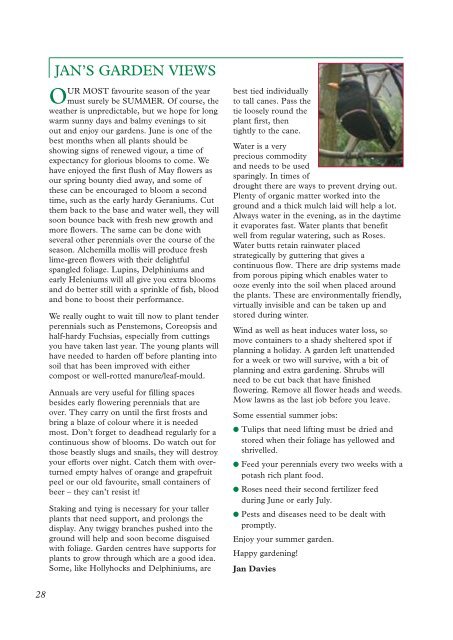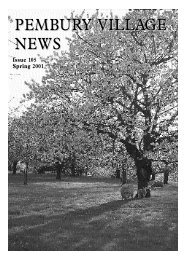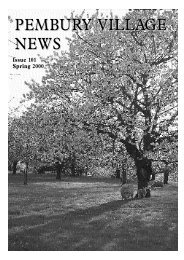Issue 122 - the Pembury Village Website
Issue 122 - the Pembury Village Website
Issue 122 - the Pembury Village Website
- No tags were found...
You also want an ePaper? Increase the reach of your titles
YUMPU automatically turns print PDFs into web optimized ePapers that Google loves.
JAN’S GARDEN VIEWSOUR MOST favourite season of <strong>the</strong> yearmust surely be SUMMER. Of course, <strong>the</strong>wea<strong>the</strong>r is unpredictable, but we hope for longwarm sunny days and balmy evenings to sitout and enjoy our gardens. June is one of <strong>the</strong>best months when all plants should beshowing signs of renewed vigour, a time ofexpectancy for glorious blooms to come. Wehave enjoyed <strong>the</strong> first flush of May flowers asour spring bounty died away, and some of<strong>the</strong>se can be encouraged to bloom a secondtime, such as <strong>the</strong> early hardy Geraniums. Cut<strong>the</strong>m back to <strong>the</strong> base and water well, <strong>the</strong>y willsoon bounce back with fresh new growth andmore flowers. The same can be done withseveral o<strong>the</strong>r perennials over <strong>the</strong> course of <strong>the</strong>season. Alchemilla mollis will produce freshlime-green flowers with <strong>the</strong>ir delightfulspangled foliage. Lupins, Delphiniums andearly Heleniums will all give you extra bloomsand do better still with a sprinkle of fish, bloodand bone to boost <strong>the</strong>ir performance.We really ought to wait till now to plant tenderperennials such as Penstemons, Coreopsis andhalf-hardy Fuchsias, especially from cuttingsyou have taken last year. The young plants willhave needed to harden off before planting intosoil that has been improved with ei<strong>the</strong>rcompost or well-rotted manure/leaf-mould.Annuals are very useful for filling spacesbesides early flowering perennials that areover. They carry on until <strong>the</strong> first frosts andbring a blaze of colour where it is neededmost. Don’t forget to deadhead regularly for acontinuous show of blooms. Do watch out forthose beastly slugs and snails, <strong>the</strong>y will destroyyour efforts over night. Catch <strong>the</strong>m with overturnedempty halves of orange and grapefruitpeel or our old favourite, small containers ofbeer – <strong>the</strong>y can’t resist it!Staking and tying is necessary for your tallerplants that need support, and prolongs <strong>the</strong>display. Any twiggy branches pushed into <strong>the</strong>ground will help and soon become disguisedwith foliage. Garden centres have supports forplants to grow through which are a good idea.Some, like Hollyhocks and Delphiniums, arebest tied individuallyto tall canes. Pass <strong>the</strong>tie loosely round <strong>the</strong>plant first, <strong>the</strong>ntightly to <strong>the</strong> cane.Water is a veryprecious commodityand needs to be usedsparingly. In times ofdrought <strong>the</strong>re are ways to prevent drying out.Plenty of organic matter worked into <strong>the</strong>ground and a thick mulch laid will help a lot.Always water in <strong>the</strong> evening, as in <strong>the</strong> daytimeit evaporates fast. Water plants that benefitwell from regular watering, such as Roses.Water butts retain rainwater placedstrategically by guttering that gives acontinuous flow. There are drip systems madefrom porous piping which enables water toooze evenly into <strong>the</strong> soil when placed around<strong>the</strong> plants. These are environmentally friendly,virtually invisible and can be taken up andstored during winter.Wind as well as heat induces water loss, somove containers to a shady sheltered spot ifplanning a holiday. A garden left unattendedfor a week or two will survive, with a bit ofplanning and extra gardening. Shrubs willneed to be cut back that have finishedflowering. Remove all flower heads and weeds.Mow lawns as <strong>the</strong> last job before you leave.Some essential summer jobs:● Tulips that need lifting must be dried andstored when <strong>the</strong>ir foliage has yellowed andshrivelled.● Feed your perennials every two weeks with apotash rich plant food.● Roses need <strong>the</strong>ir second fertilizer feedduring June or early July.● Pests and diseases need to be dealt withpromptly.Enjoy your summer garden.Happy gardening!Jan Davies28
















